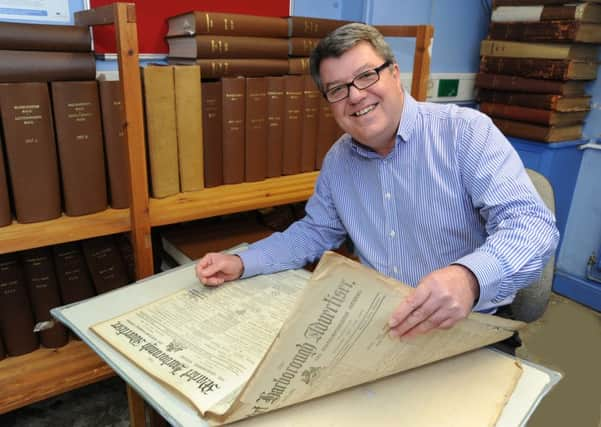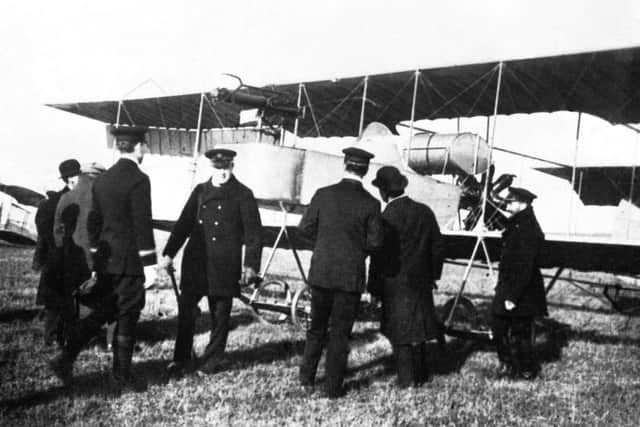JOHN DILLEY'S WWI BLOG: How Churchill predicted World War Two


Two fascinating insights into World War One life are glimpsed in the Market Harborough Advertiser’s edition of January 2, 1917 – one a global opinion from a certain Winston Churchill about the possibility of a second great conflict and the other an all together much more local view.
Churchill, more commonly remembered for his role as Prime Minister in the 1939-1945 hostilities, was Munitions Minister in the latter part of the Great War and his opinion column in the Advertiser this week predicted further ‘treachery’ by Germany if the Allies won anything but total victory.
Advertisement
Advertisement
He believes that a ‘surprise attack on England played no part in Germany’s far-reaching plans’. But he says: “Can we be sure that the next fatal moment will not be fixed exclusively for us and that a surprise attack out of profound peace by treachery will not be our sole warning that the great struggle has recommenced.”


He adds in his column, taken from the January edition of the national publication London Magazine: “We must finish the business now. Now is the time and now is the only time. The means can be found if the will is not lacking. Whatever the cost we must drive remorselessly on until we reach a victory so decisive that it carries with it as its first consequence the liberation of the German people from the vile system of which they have made themselves the slaves.”
With hindsight we now know that despite an Allied victory the peace secured at the Treaty of Versailles was not enough to stop another global struggle two decades later.
On a more local level we are also given an insight into the way ordinary Market Harborough people are getting through a third Christmas without peace.
Advertisement
Advertisement
“The shadow of the great war was over everything,” says an editorial on page 2. “And the generally expressed opinion of the great festival was ‘it is not a bit like Christmas’.”


There is an intriguing mention of Charles Dickens, clearly a national icon even in the early part of the 20th century as the Advertiser’s editorial continues. “For once in a number of years the weather around Christmas was ‘Krismussy’. Dickens has perhaps given us the best description of an old-fashioned English Christmas when the snow was deep, skating was possible on the ponds and all was merry.
“The week preceding Christmas Day we certainly had the elements which went to make a Dickens’ Christmas but they were sufficient to make things very uncomfortable indeed.”
Snow and sleet fell on Christmas Eve morning with the ‘result that the paths and roads were inches deep in slush, making the plight of the shopkeeper and the shopper a very miserable one’.
Advertisement
Advertisement
“So bad did it become that many ‘mere men’ had to secure the Christmas bargains and do the Christmas shopping, an onerous task they accomplished quite cheerfully we hope.”
The column continues: “When darkness set in Harborough the streets presented about the most un-Christmas-like appearance it would be possible to conceive. Inside the shops presented the bright and attractive appearance always associated with Christmas displays but not the outer world as the shops displayed no brilliantly lit and dressed windows. By stern decree the windows were darkened, the streets were unlighted.”
The column concludes: “With true British spirit everyone made the best of things, slipped and slushed along laden with parcels, bumping into and being cannoned into.
“What a war Christmas. Not one, we opine, but what devoutly hoped that ere another Christmas comes round Peace will have been declared and the boys be home for ‘good and all’ to share in Yuletide festivities.”
Advertisement
Advertisement
Sadly we know there are still nearly two years of fighting before the boys are back.
This column is published every Monday by John Dilley on the Newspapers and the Great War website and will continue until the 100 th anniversary of the final armistice in November 2018.
John’s fellow researcher and De Montfort University lecturer David Penman is conducting a similar real-time project with the Ashbourne Telegraph. Check out his Great War Reports.